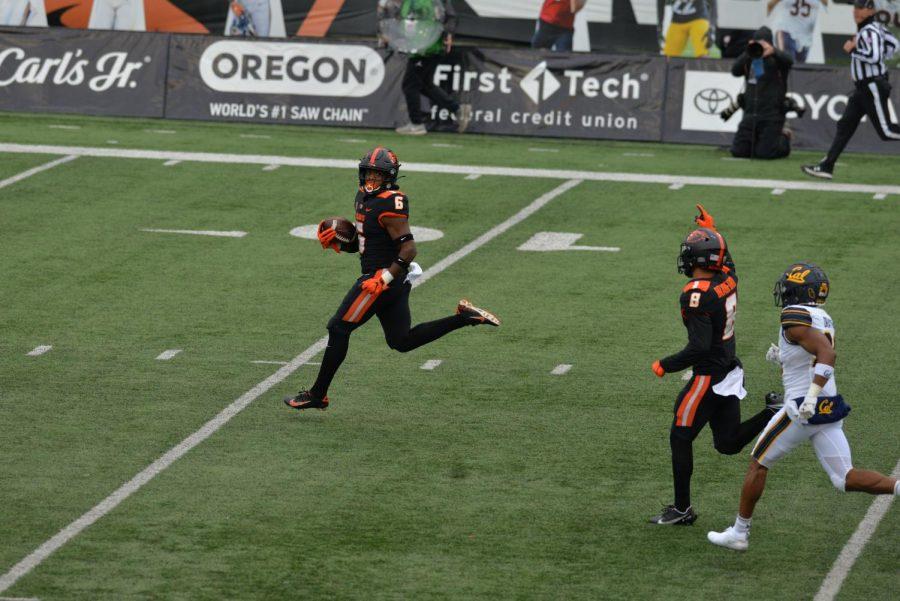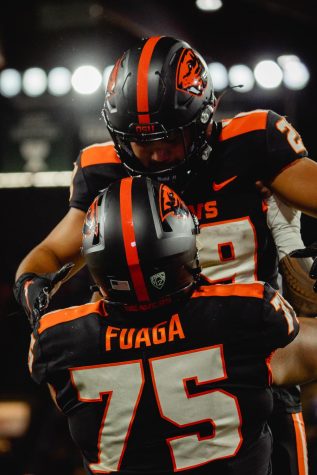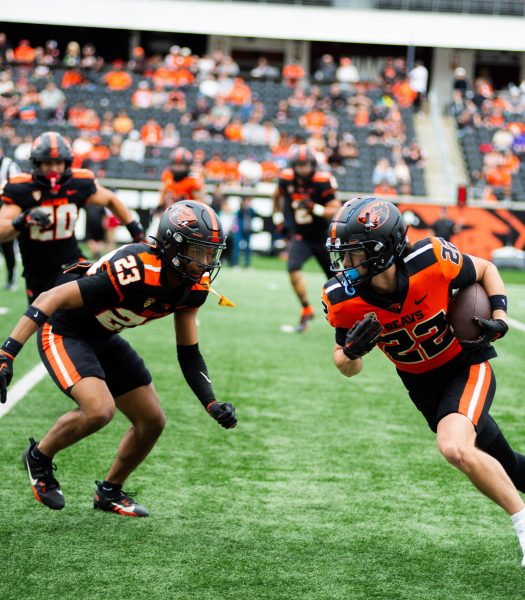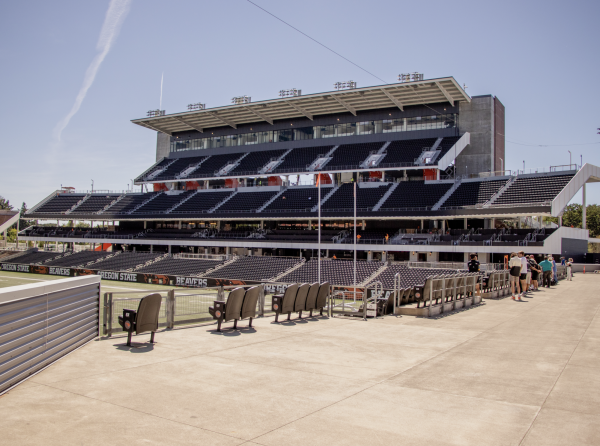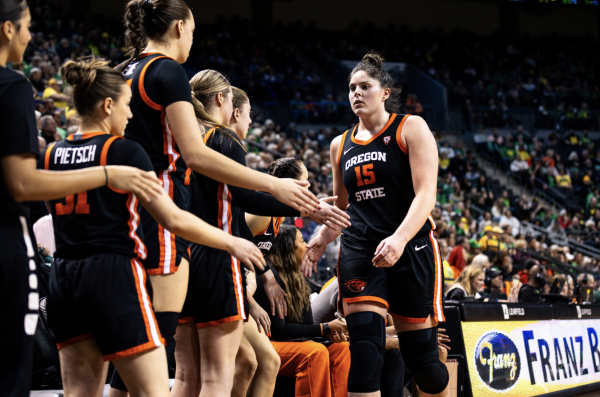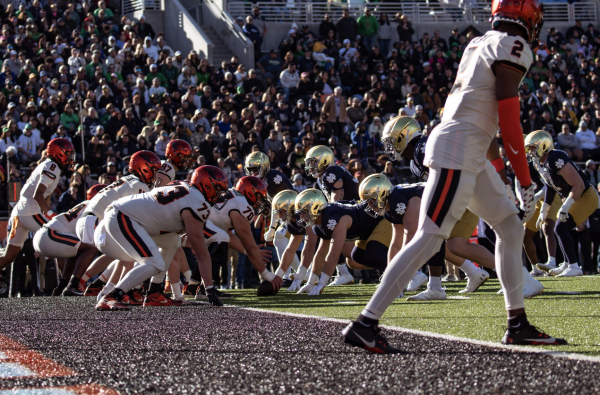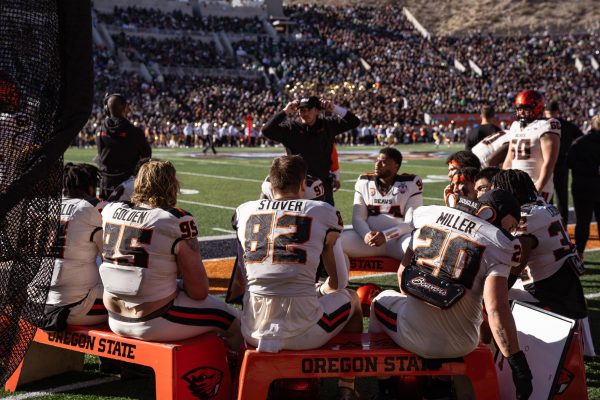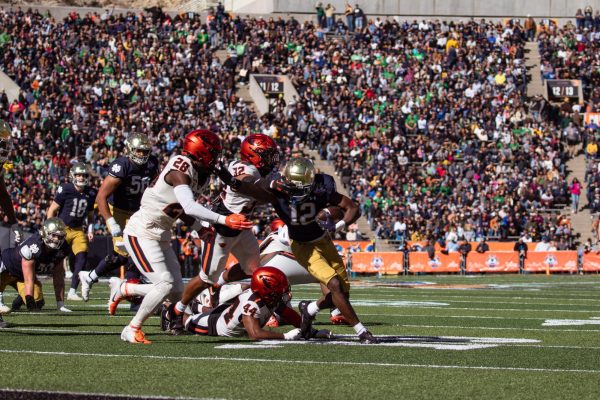New coach AJ Steward hopes to continue OSU’s running game success
March 16, 2021
Steven Jackson, Jacquizz Rodgers, Ryan Nall, Jermar Jefferson, all Oregon State Beavers running backs that have wound up as program legends. But for running backs to succeed, they often need a skilled coach backing them.
For Oregon State Football in the upcoming 2021 season, which begins its spring training in just a few short weeks on April 8, that coach will be AJ Steward, as former running backs coach Michael Pitre was offered the same position for the Chicago Bears in the NFL.
Steward is a young coach, still in his thirties, but he has already accumulated nine years of coaching experience in college. Steward, who is from St. Louis, MO. played for the nearby Kansas Jayhawks in college from 2007 to 2009, winning scout team player of the year in 2007 for the team.
But even though Steward’s new role sees him coaching the Beavers’ running backs, he never actually played the position he now coaches. This began in his first job as a graduate assistant for the Rice Owls in 2012.
“In college, I had played quarterback, receiver and tight end,” Steward said. “So when the offensive coordinator [John Reagan, who had been the offensive line coach at Kansas] told me I’d be working with the running backs at first I was like, ‘Come on now are you serious? There’s o-line or running back, the two worst places to put me right now.’”
But Steward believes that the new experience actually ended up helping him develop as a coach, as he had to learn the game in a whole new way.
“Looking back, I’m really grateful that he put me there because it forced me to get uncomfortable and really roll back my sleeves and learn football from a running back’s perspective,” Steward said. “It taught me football in a way I had never seen it. It’s really been great. I had to learn how to coach and how to teach. I couldn’t rely on, you know, just putting on some film and saying, ‘Hey, look what I did and just do what I did in this clip right here.’ You can’t rely on that, so it forced me to become a great teacher and really find strategic ways to get the most out of my running backs.”
With that mindset, Steward was eventually promoted to the running backs coach at Rice in 2014 and held that position for four years. His teams played consistently well on the ground during Steward’s tenure, never having the team average less than 167 rushing yards per game in a season and peaking with 187 yards per game in 2017, which ranked 38th in the country.
After that, Steward took the running back coach job at BYU under Head Coach Kalani Sitake, who had actually been the Oregon State defensive coordinator and assistant head coach in 2015 before taking the BYU job. This connection was part of why Steward felt comfortable switching jobs and moving to Corvallis.
“[Sitake] told me about [OSU],” Steward said. “He said it was definitely a great place that I would enjoy. I value his opinion and his word on things. He really loved his experience here, I know he was here for a short time but he said it was a no-brainer, a place to go. The culture that’s built here is very similar in ways to what we had at BYU. So he expressed that and said it would be a good fit, and just a place where my wife, my son and I would love to live.”
It’s no surprise that Steward and Sitake have a good relationship, as the two seasons Steward coached there were successful ones for BYU running backs. Despite multiple injuries to players at the position, Steward was able to lead the team to over 2,000 yards rushing in 2019 for the first time since 2016.
For his work at BYU, Steward was then able to get a Power 5 conference job for the first time in his career, coaching running backs for the Arizona Wildcats under Kevin Sumlin. The Wildcats ranked eighth in the PAC-12 in rushing yards in the shortened 2020 season, despite playing in five of their seven originally scheduled games, each of which ended in a loss. The 0-5 recorded resulted in Sumlin’s firing at the end of the season.
Thus, with a different head coach coming in at Arizona, Steward decided to head to Corvallis, even taking a pay cut to do so. He explained that his decision came partly from watching the Beavers play while watching film in Tucson.
“I told Coach [Jonathan] Smith when we were talking before everything was official, I had the benefit of watching OSU play a couple of times last year because of common opponents. Particularly I watched the Washington game and I watched the whole Oregon game live,” Steward said. “I was just really pleased with the brand of football they played, just the discipline these guys played with. From my perspective watching and just seeing guys flying around and making plays I just thought, I love that culture there. Culture means the most to me, and building something that isn’t just short-term success but something that builds a foundation brick by brick. I absolutely wanted to be a part of that.”
The running game was a big part of the Beavers’ win against Oregon in 2020, with Jermar Jefferson running all over the Ducks for 226 yards and two touchdowns. This was reminiscent of the Beavers’ last win over the Ducks before that, in 2016 where Ryan Nall and the rest of the Beavers’ rushing attack put together 300 yards and four touchdowns in a 34-24 home win.
A strong running game has led to success at Oregon State recently, being the driving force behind two of the program’s most significant wins over the last five seasons. Steward realizes that the rushing foundations in Corvallis are strong, especially after Pitre’s strong tenure.
“Coach Pitre is a guy that I’ve kind of studied from afar,” Steward said. “I’ve always had a tremendous amount of respect for how the fundamentals of the guys he coaches and how they’re sound with what they do from a running back perspective. I’m honestly grateful that he laid a good foundation here with the guys that are currently here and a legacy of being able to come here and be a big-time running back and living out your dreams at the next level if you come here. It makes my job a little bit easier to get here and coach guys that have already been well-coached.”
The strong foundations Pitre developed during his coaching run include a deep running back room for next year, which includes BJ Baylor, a senior who has 800 total yards and 10 total touchdowns in his career over 24 games as a backup, and South Carolina Gamecocks transfer Deshaun Fenwick, a former three-star recruit.
But even with the talent in the running back room, Steward does not yet know what his plan will be for next year. For now, he’s just getting to know the players a bit better.
“I’ve been here less than two weeks,” Steward said. “For me, it’s more just getting to know these guys off the field right now, kind of understanding their learning abilities before we start ramping up. Just getting to know them as a person, I think that’s more important than projecting depth charts and things like that. That’ll come. We’ve got spring ball coming up after spring break, that’ll be a good gauge. I think the good part is we have a handful of guys that are really intriguing, I think it’s a really good situation to be in as a running back here right now.
But even while living in the present and not projecting forward with his depth charts, Steward is still looking towards the future in other regards, primarily in recruiting. The coach’s connections throughout the recruiting hotbeds of the American Southwest that he’s worked in are one’s that Steward hopes can supplement Oregon State’s roster whenever there’s a gap that the Pacific Northwest can fill.
“Over the years, you create these bonds with coaches and get kind of a good feel for regions of the country,” Steward said. “I definitely think that will be a good resource. We’ll always do the majority of our recruiting up here in the Northwest, but there are different situations that bring those opportunities up where you used your connections in Houston or Dallas, for example, and make those connections work. I think that’s always on the table, it’s something that’s good to have in your back pocket.”
For now, though, Steward is focusing on getting to know the team and getting to work on following up a strong rushing performance from last season where the Beavers averaged nearly 200 yards per game. It won’t be easy with Jefferson declaring for the NFL early, but Steward is up for the challenge.
Steward believes that to succeed, everyone needs good people around them and supporting them. He thinks he’s found that in Corvallis.
“It’s been a great first couple of weeks. I love it here in Corvallis, I love the staff, I love my guys I get to coach, great kids. It’s just great people, is kind of my first impression,” Steward said. “I’m excited about that, it’s something I value. When you work somewhere you want to be around good people. It’s comforting to know that you’re here with people that have the same goals and mindset as you and are just trying to make this place as good as we can and trying to lift people up during that process. I’m excited, I’m grateful to be here, and I’m ready to get to work.”












































































































